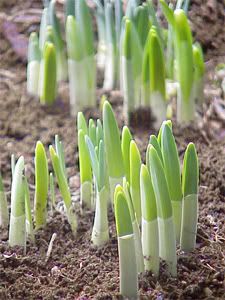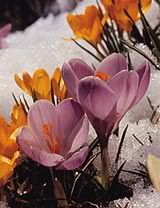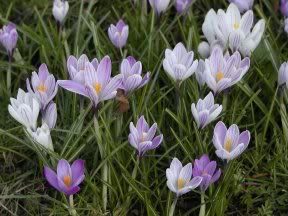 I am the worst gardener. Over the years, I’ve killed two cacti, a jasmine bush, and several potted plants. But I have had some success with bulbs. A few weekends ago, I planted a few dozen purple and blue hyacinths, anemones, tulips, and crocus. If all goes well, and the squirrels don’t steal them away during the winter, the bulbs should bloom in the spring, right in time for Lent.
I am the worst gardener. Over the years, I’ve killed two cacti, a jasmine bush, and several potted plants. But I have had some success with bulbs. A few weekends ago, I planted a few dozen purple and blue hyacinths, anemones, tulips, and crocus. If all goes well, and the squirrels don’t steal them away during the winter, the bulbs should bloom in the spring, right in time for Lent.
Contrary to our typical desert-dry liturgical image of the season, Lent coincides with spring when the daffodils and other bulbs planted before the winter frost begin to bloom. In the Bay Area, the shift to spring isn’t so dramatic. But in other geographical areas, spring is the most turbulent, wettest time of the year. Winter snows persist and spring storms attack the tender buds and shoots of young plants and bare trees. In this hostile environment, calves, lambs, and other newborns fight to make it to the more gentle days of early summer.
 In a similar way, the church’s most vulnerable—the Elect—are fighting their own spring battle. During Lent, the Elect, their godparents, and the church community begin an intense discipline to prepare for the Easter celebration at which the Elect will be baptized. This discipline includes intensified prayer, fasting, and works of charity and justice.
In a similar way, the church’s most vulnerable—the Elect—are fighting their own spring battle. During Lent, the Elect, their godparents, and the church community begin an intense discipline to prepare for the Easter celebration at which the Elect will be baptized. This discipline includes intensified prayer, fasting, and works of charity and justice.
The church sees itself as a participant in the great drama and struggle between good and evil, between God and the devil. From this perspective, this period of Lent and this intense preparation by the Elect is somewhat like the final moments before a great battle, and it may be when the Elect and the church are at their most vulnerable. When faced with the awesome invitation to baptism in the midst of so much pain and suffering in one’s life and in the world, it can be easy to lose heart and lose faith. In a way, it is like an engaged couple with cold feet before their wedding day: Will I be worthy enough for this person? Can I stay faithful when society makes it so easy to not be? Am I making the right choice? Is this really what I want? Thus, it is no accident that Lent takes place in spring.
 For this reason, the church prays fervently for the Elect in rites called Scrutinies. Through these rites on the third, fourth, and fifth Sundays of Lent, the church prays that God will strengthen the good things that have been growing in the Elect’s faith life and will remove the barriers that keep the Elect from trusting completely in God. During this period, there are also other prayers, blessings, and anointings for the Elect to give them the courage they need to profess their faith in God and make it through to the other side of those baptismal waters.
For this reason, the church prays fervently for the Elect in rites called Scrutinies. Through these rites on the third, fourth, and fifth Sundays of Lent, the church prays that God will strengthen the good things that have been growing in the Elect’s faith life and will remove the barriers that keep the Elect from trusting completely in God. During this period, there are also other prayers, blessings, and anointings for the Elect to give them the courage they need to profess their faith in God and make it through to the other side of those baptismal waters.
Planting purple and blue spring bulbs might not reflect the deeper struggle that Lent evokes. But preparing soil, planting seeds, paying attention, and waiting in joyful hope is a very eucharistic act. Plant your purple and blue bulbs now, at home and around the church, so that when spring comes, your environment might also participate in Lenten spring with all the Elect and the church.
No comments:
Post a Comment